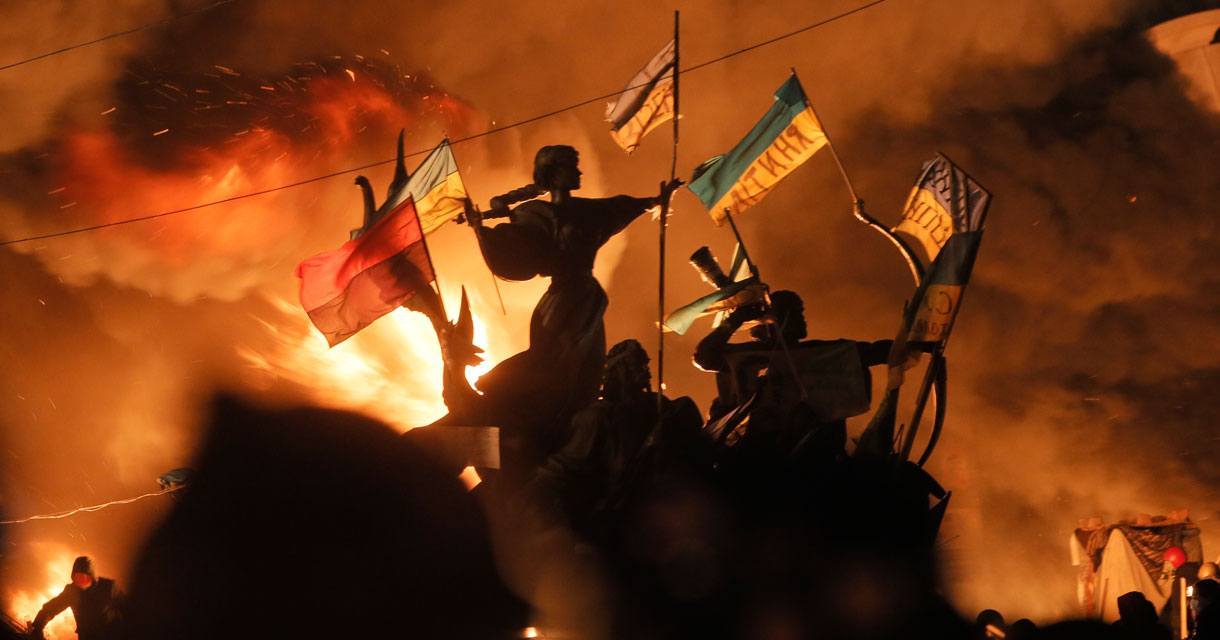It has been the Western, pro-EU, pro-NATO camp that has trumpeted its supposed devotion to the defense of democracy when discussing the Euromaidan protests of late 2013 and their fallout. What made many skeptical of their claims of being champions of democracy from the beginning was their open support for the use of force to overthrow a democratically elected president, Viktor Yanukovych. It would seem that usurping Yanukovych’s power violated the Ukrainian constitution. What was Yanukovych’s crime in the eyes of the West? Choosing to seek closer economic ties for Ukraine with Russia instead of signing an Association Agreement with the EU.
In the West, those who spoke of the possible inconsistencies of the pro-Euromaidan side were mostly drowned out in major news outlets. Major publications like Time Magazine had been sounding anti-Vladimir Putin alarms long before Euromaidan even took place. The Euromaidan and Russia’s annexation of Crimea sent Western media into what appeared to be nearing full bore panic mode. Perhaps most memorable was The Economist magazine’s over-the-top “Putin’s Inferno” cover. Hackneyed clichés about Putin being a 21st century Adolf Hitler were being used widely. The fact that it was the anti-Russian side that used violent means to overthrow a democratically elected leader, or that the majority of Crimeans were in favor of a reunion with Russia, did not stop the vilification of Putin and his supporters.
More than a year has now passed since the Euromaidan. In addition to Russia’s annexation of Crimea, we’ve seen a bloody civil war break out in eastern Ukraine between the pro-Russian separatists of the east (where Yanukovych had gotten the majority of his electoral support) and the Ukrainian army, taking orders from the newly installed Kiev government. This new government is generally supported by the people of western Ukraine, or at least preferred to the previous government. New elections held in May made Petro Poroshenko the president.
While the Euromaidan, the annexation of Crimea, and the Ukrainian Civil War are all major news stories in their own right, they are also part of a bigger picture geopolitical struggle between Russia and the West that some worry could be as serious as setting the foundation of a third World War. While the anti-Russia, anti-Putin sentiment is still very strong in the West’s ruling class, some notable voices of dissent have been making themselves heard. In a December 20th article in the British newspaper The Daily Mail entitled “Forget ‘evil’ Putin–we are the bloodthirsty warmongers,” English journalist and author Peter Hitchens writes,
“Now I seem surrounded by people who actively want a war with Russia, a war we all might lose. They seem to believe that we are living in a real life Lord Of The Rings, in which Moscow is Mordor and Vladimir Putin is Sauron.”
He goes on to write, “Until a year ago, Ukraine remained non-aligned between the two great European powers. But the EU wanted its land, its 48 million people (such a reservoir of cheap labour!) its Black Sea coast, its coal and its wheat. So first, it spent £300 million (some of it yours) on anti-Russian ‘civil society’ groups in Ukraine. Then EU and Nato politicians broke all the rules of diplomacy and descended on Kiev to take sides with demonstrators who demanded that Ukraine align itself with the EU.”
It is voices like these that are challenging the West’s liberal elite’s claims to be the guardians of democracy. Recent news out of Sweden (an EU member since 1995) will be bound to raise even more questions about the intentions of pro-EU liberals. On Saturday, Swedish Prime Minister Stefan Lofven announced the cancellation of the upcoming elections, in which the Sweden Democrats (a political party) were expected to make large gains. The cancellation came after the “center-left” and “center-right” parties came to a bargain on a budget, and is an obvious effort to isolate the up-and-coming Sweden Democrats. One cannot help but notice that many among the West’s liberal establishment only seem to support democracy when they agree with the voters’ decisions.
Opinion by Robert Inskip
